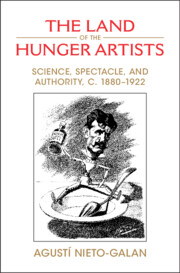Conclusion
Published online by Cambridge University Press: 09 November 2023
Summary
The “Conclusion” presents the potential benefits of human fasting experiments and performances to ‘advance’ medical knowledge, as described by Dr Gunn, a member of the supervisory board of Dr Henry Tanner’s fast in New York in 1880, and one of his biographers. It is through the historical analysis of these ‘benefits’ that this final chapter discusses the actual epistemological value and historical agency of hunger artists, and summarizes the main analytical frameworks of the book. This final chapter also recapitulates the main landmarks of the rich ‘topography’ of the land of the hunger artists, from the long list of cities in which public fasts took place, to the variety of ‘citizens’ of the land who circulated across its vast territory and the places and material objects that brought doctors, fasters, impresarios, and global publics together. At the end of the conclusion, I have added a short discussion about the reasons for the hunger artists’ decline in the 1920s, in an endeavour to place Kafka’s pessimistic view of the metier in a proper context.
- Type
- Chapter
- Information
- The Land of the Hunger ArtistsScience, Spectacle and Authority, c.1880–1922, pp. 160 - 170Publisher: Cambridge University PressPrint publication year: 2023

